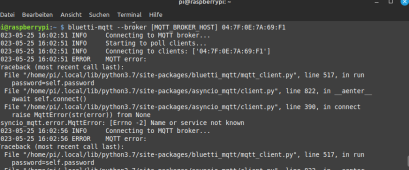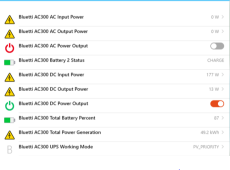Hello everyone, I need your help. I can't get the connection to Bluetti-MQTT in. Broker is installed and running. Another client is also installed, the data points are also created there, but the values are empty because the connection to Bluetti-MQTT does not work.
I installed it according to these instructions on a Raspi 3b: https://github.com/warhammerkid/bluetti_mqtt
In addition, I had to install Phyton, which I did with the command sudo apt-get install python python3 python-pip python3-pip.
This is what is in my conf file:
This is my error message
Screenshot Iobroker:

Anyone an idea?
I installed it according to these instructions on a Raspi 3b: https://github.com/warhammerkid/bluetti_mqtt
In addition, I had to install Phyton, which I did with the command sudo apt-get install python python3 python-pip python3-pip.
This is what is in my conf file:
Description=Bluetti MQTT
After=network.target
StartLimitIntervalSec=0
[Service]
Type=simple
Restart=always
RestartSec=30
TimeoutStopSec=15
User=pi
ExecStart=/usr/local/bin/bluetti-mqtt --broker **** --username **** --password *****+ --interval 60 ******
[Install]
WantedBy=multi-user.target
This is my error message
Connecting to ****
Waiting for connection...
ERROR:root:Reconnecting to ***** after error:
Traceback (most recent call last):
File "/usr/local/lib/python3.9/dist-packages/bluetti_mqtt/bluetooth/client.py", line 50, in run
await self.client.start_notify(
File "/usr/local/lib/python3.9/dist-packages/bleak/__init__.py", line 639, in start_notify
raise BleakError(f"Characteristic {char_specifier} not found!")
bleak.exc.BleakError: Characteristic 0000ff01-0000-1000-8000-00805f9b34fb not found!
ERROR:root:Error connecting to device 04:7F:0E:AD:84:D6:
Traceback (most recent call last):
File "/usr/local/lib/python3.9/dist-packages/bluetti_mqtt/bluetooth/client.py", line 40, in run
await self.client.connect()
File "/usr/local/lib/python3.9/dist-packages/bleak/__init__.py", line 471, in connect
return await self._backend.connect(**kwargs)
File "/usr/local/lib/python3.9/dist-packages/bleak/backends/bluezdbus/client.py", line 190, in connect
assert_reply(reply)
File "/usr/local/lib/python3.9/dist-packages/bleak/backends/bluezdbus/utils.py", line 20, in assert_reply
raise BleakDBusError(reply.error_name, reply.body)
bleak.exc.BleakDBusError: [org.bluez.Error.Failed] Operation already in progress
ERROR:root:Error connecting to device ******
Screenshot Iobroker:

Anyone an idea?





